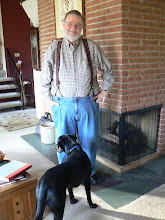Tuesday, April 27, 2010
Cliff Kirkpatrick - part 2
Monday, April 26, 2010
Cliff Kirkpatrick - part 1
Allan Boesak and Africa - part 1
- Is Jesus Lord, or is our ecclesiastical paradigm lord?
- Is Jesus Lord, or are our structures lord?
- Is Jesus Lord, or are our buildings lord?
- Is Jesus Lord, or are the ways we do our programs lord?
Sunday, April 25, 2010
In Louisville
“I have gotten to see so many different contexts” and have a broader understanding of the world Church, Johnson said of her role with LWF. Her duties include coordinating LWF’s relationships with other Christians around the world.
Kathryn was my advisor when I was working on my D.Min. years ago.
The other lecturer I plan to set up an appointment with is Allan Boesak. Although out of the spotlight of much of the world after personal and family problems years ago, Boesak was a major player in the Christian struggle against apartheid in his homeland of South Africa.
Both Johnson and Boesak will be able to offer a much larger view of the world Church that I think will be helpful in my exploration. I look forward to the conversations, and trust they will be able to make time.
On Tuesday and Wednesday, it will be more lectures from them, but also visits with some folks at the General Assembly offices.
Grace and peace - Steve
